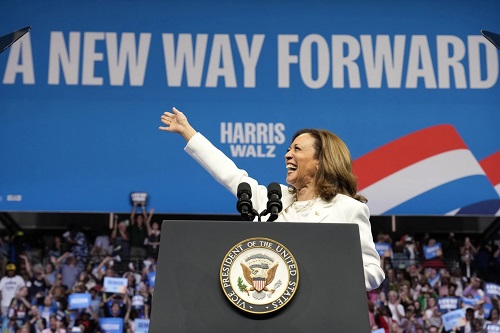
High stakes and unpredictable turns: The 2024 Presidential race heats up
As the 2024 US Presidential race unfolds, the strategic maneuvers of key candidates are drawing scrutiny and shaping the electoral landscape in significant ways. Vice President Kamala Harris’s conspicuous absence from the public eye, particularly her avoidance of in-depth interviews, raises critical questions about her campaign strategy. Historically, successful presidential campaigns hinge on a candidate’s ability to connect with voters, articulate policies, and address concerns head-on. Harris’s reluctance to engage with the media and the public could be a double-edged sword—while it may shield her from potential missteps, it also risks portraying her as aloof or out of touch, which could erode voter confidence, especially among undecided or swing voters.
In contrast, former President Donald Trump’s campaign is defined by his unabashed use of personal attacks and incendiary rhetoric. Trump’s approach to politics—marked by his willingness to engage in name-calling and provocative statements—has been a hallmark of his political brand. This strategy has proven effective in energizing his core supporters, who view him as a fighter unafraid to speak his mind. However, this same strategy may be alienating to moderate Republicans and independents who are tired of divisive politics. Trump’s legal challenges, particularly his reindictment and the pending sentencing on 34 criminal counts, add a significant layer of uncertainty to his campaign. These legal battles could galvanize his base, framing him as a martyr of the so-called “deep state,” but they also pose a serious risk by casting a long shadow over his electability in the general election. Voters may question the wisdom of backing a candidate entangled in such serious legal issues, particularly when stability and leadership are in high demand.
The potential entry of Robert F. Kennedy Jr. and Tulsi Gabbard into the race as potential spoilers or even as third-party candidates presents another complex dynamic. Kennedy, with his storied family name and his platform on issues like vaccine skepticism, could attract a diverse group of voters from across the political spectrum. Gabbard, with her anti-establishment credentials and focus on foreign policy, particularly her criticism of US military interventions, also holds appeal for disaffected voters on both the right and left. Their involvement could be a double-edged sword for Trump. On one hand, they might siphon votes from Biden or a potential Democratic nominee, potentially aiding Trump. On the other hand, they could also draw away crucial votes from Trump’s base, particularly those voters who are more inclined towards anti-establishment or libertarian views, thus splintering the conservative vote.
The Democratic strategy, particularly how they choose to navigate Harris’s public presence and respond to Trump’s aggressive tactics, will be crucial. If Harris continues to avoid public scrutiny, it could become a focal point of Republican attacks, portraying the Biden-Harris administration as evasive or unwilling to face the American people. Conversely, if the Democrats can effectively counter Trump’s legal and ethical challenges with a message of stability and integrity, they may sway voters who are exhausted by the turmoil of the Trump years.
The Republican primary itself is another arena to watch. With Trump’s dominance still evident, how the party navigates his legal challenges and whether figures like Kennedy and Gabbard align themselves with or against Trump will be telling. The GOP faces a delicate balancing act—supporting Trump might secure the loyalty of his base but could alienate moderates and swing voters crucial for a general election victory.
Ultimately, this race is shaping up to be one of the most unpredictable in recent memory. The interplay between Harris’s media strategy, Trump’s legal woes and combative style, and the potential wildcard entries of Kennedy and Gabbard creates a volatile mix that will require careful navigation by all involved. The impact of these factors on the broader electorate remains to be seen, but one thing is certain: the 2024 race is set to redefine the contours of American politics, with lasting implications for the nation’s future.